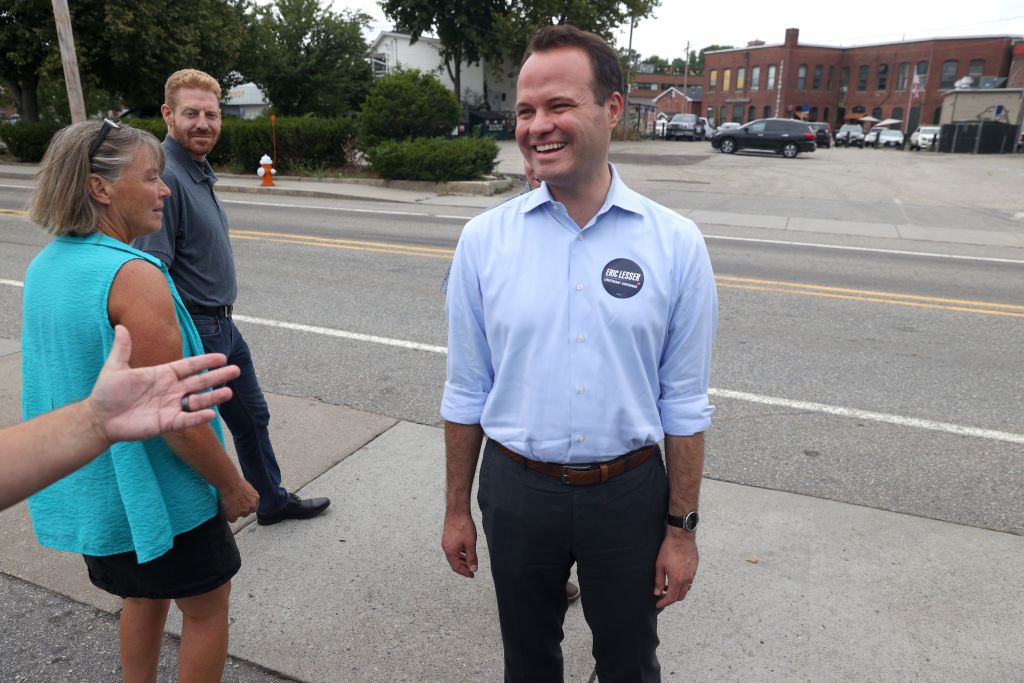
As expected, state Attorney General Maura Healey won the Democratic nomination for Massachusetts governor Tuesday, months after she effectively cleared the field and strode one step closer to making history as the first woman elected to lead the commonwealth and potentially break another ceiling as the first lesbian in the country elected to the corner office in a statehouse.
Big? Sure. And more on what Healey’s political future might look like below. But her win was not the real Democratic headline coming out of Boston on Tuesday.
Instead, it was the slow-boil drama about Healey’s running mate that kept Bay State insiders humming with the slightest uncertainty. That’s because one candidate in the lieutenant governor race had the state’s party leaders behind her, and the other had the clear backing of Barack Obama.
It was scarcely a secret that the Massachusetts Democratic Party favored Salem Mayor Kimberley Driscoll as a running mate for Healey, over state senator Eric Lesser, a 30-something idealist who got his start working on Obama’s first campaign even before graduating from college.
Both candidates had their own appeals to the party base in Massachusetts, even if there wasn’t a ton of daylight between them, or with state Rep. Tami Gouveia who placed a distant third. Driscoll campaigned as a steady insider, an even-handed figure who would help Healey shore up her support among female voters; the Healey-Driscoll ticket is the first time Massachusetts voters picked an all-female team for governor and lieutenant governor. Lesser, meanwhile, was a technocrat’s dream candidate, a former West Wing aide who worked on economic policy after graduating from his roles as human answering machine and one-man luggage manager.
[A needed disclosure and background: I have been friendly with Lesser for 15 years, dating to our mutual days traipsing through New Hampshire at the start of Obama’s nascent bid. I am not unique in that regard among the press corps. In the White House, Lesser was the gatekeeper for Obama alter-ego David Axelrod, who hosted fundraisers for his former aide.]
Healey, of course, kept publicly neutral. But Driscoll won the endorsement at the state party convention in June and immediately became the person to beat. Lesser had seen the play before; after all, the unofficial posture of the Democratic Party in 2008 was that it was Hillary Clinton’s nomination to lose, until Obama’s team short-circuited that conventional wisdom.
Still, an Obamaesque come-from-behind campaign is a once-in-a-generation accomplishment. And while the Obama alumni network came out in force and helped Lesser stay competitive in the money race, it couldn’t match the power of a state political machine or an outside super PAC powered, in part, with Republican developers’ dollars. Even Lesser landing the coveted status symbol of a photo-op walking and chatting with his former top boss in Martha’s Vineyard wasn’t enough to spook the state party.
But while the lieutenant governor race stoked plenty of drama, Healey’s glide path to her party’s nomination is teeing up different conversations.
Massachusetts has an open race for governor this year. Charlie Baker, the popular Republican incumbent, opted for the exits after ex-President Donald Trump endorsed a primary challenger, Geoff Diehl, who won Tuesday night. It mirrored Maryland Gov. Larry Hogan’s choice to bypass another election. The same can be said for Arizona Gov. Doug Ducey. Rather than fight the MAGA Movement, the trio opted to find easier lives.
With Diehl as the nominee, Massachusetts is one of the Democratic Party’s ripest chances to reduce their deficit in governorships. Republicans have a six-seat advantage over Democrats at the moment, although Trump-like GOP candidates in multiple states puts that number on shaky ground. Democratic meddling to boost perceived extremists hasn’t hurt, either. (Unless, of course, those extremists win.)
Healey’s now expected to win in the fall, raising new questions about her future. Few political insiders credibly think Healey’s political career ends on Beacon Hill, and it’s entirely possible she could eventually be plucked for a federal posting. She’s been on the forefront of gun violence prevention for years, sued the Donald Trump administration almost 100 times, and has a turnkey LGBTQ fundraising advantage nationally that is potentially second only to Transportation Secretary Pete Buttigieg.
And bear in mind: the governor’s office in Boston isn’t a terrible launching pad for a presidential run: of the last six CEOs of Massachusetts, four have sought the White House. Two—Michael Dukakis and Mitt Romney—captured the nomination. Of course, neither won.
Still, three of those four presidential contenders were white dudes, and all were straight. And, in a Democratic Party looking for change, a lesbian trainblazer with a powerful donor Rolodex could be mighty appealing, if not in 2024, then in 2028 or beyond. Massachusetts Democrats are betting this isn’t Healey’s last act. And, quietly, the most popular Democrat in the country—who has an estate on Martha’s Vineyard—suspects Lesser’s final act isn’t written, either.
More Must-Reads From TIME
- The 100 Most Influential People of 2024
- Coco Gauff Is Playing for Herself Now
- Scenes From Pro-Palestinian Encampments Across U.S. Universities
- 6 Compliments That Land Every Time
- If You're Dating Right Now , You're Brave: Column
- The AI That Could Heal a Divided Internet
- Fallout Is a Brilliant Model for the Future of Video Game Adaptations
- Want Weekly Recs on What to Watch, Read, and More? Sign Up for Worth Your Time
Write to Philip Elliott at philip.elliott@time.com